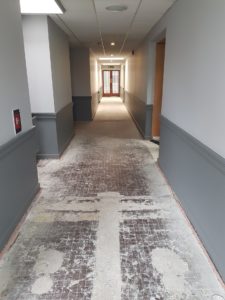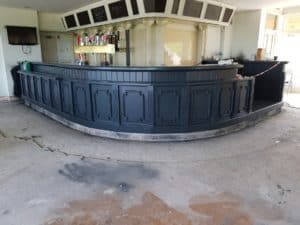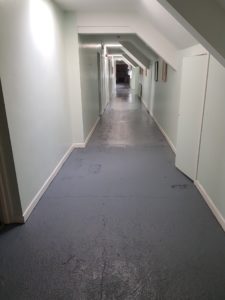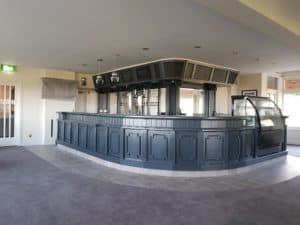Welcome to PaintingInColour, your trusted concrete floor painting company in Dublin. We offer professional concrete floor painting services for both residential and commercial clients, including epoxy floor coatings, concrete staining, and more. Our team of skilled painters and decorators in Dublin has the expertise and knowledge to handle any concrete floor painting project, big or small.
Concrete Floor Painting Dublin
At PaintingInColour, we understand that concrete floors are an important part of your property, and that’s why we offer customised concrete floor painting solutions that meet your specific needs and requirements. Our team of skilled painters and decorators in Dublin has the expertise and knowledge to handle any concrete floor painting project, big or small.
Our concrete floor painting Dublin services include:
Epoxy Floor Coatings: We offer professional epoxy floor coating services that can transform your concrete floors into a beautiful and functional space. Our team of skilled painters and decorators in Dublin will use only the best quality materials and techniques to ensure a flawless finish.
Concrete Staining: We offer professional concrete staining services that can enhance the look and feel of your concrete floors. Our team of skilled painters and decorators in Dublin will work closely with you to understand your specific needs and requirements, and we always deliver exceptional results that exceed your expectations.
Why Choose PaintingInColour for Your Concrete Floor Painting Needs?
At PaintingInColour, we understand that concrete floor painting can be a significant investment, and that’s why we are committed to delivering high-quality services that meet your specific needs and requirements. Our team of skilled painters and decorators in Dublin has the expertise and knowledge to help you achieve the look and feel you desire for your concrete floors.
We use only the best quality materials and techniques, and we always ensure that our work is completed on time and within budget. Our team of skilled painters and decorators in Dublin will work closely with you to understand your specific needs and requirements, and we always deliver exceptional results that exceed your expectations.
We also offer free consultations and quotes, so you can get an accurate estimate of the cost of your concrete floor painting project. Our concrete floor painting Dublin prices are highly competitive, and we always strive to provide our clients with the best value for their money.
How to contact us?
At PaintingInColour, we are committed to delivering high-quality concrete floor painting services that meet your specific needs and requirements. Our team of skilled painters and decorators in Dublin has the expertise and knowledge to help you transform your concrete floors into a beautiful and functional space.
Contact us today to schedule a free consultation and quote for your concrete floor painting project, and let us help you transform your concrete floors into a beautiful and inviting environment. With PaintingInColour, you can rest assured that your concrete floor painting project is in good hands.
FAQ
How long does it take to complete a concrete floor painting project in Dublin?
The time it takes to complete a concrete floor painting project in Dublin will depend on the size and complexity of the project. Our team of skilled painters and decorators in Dublin will work efficiently to complete the project as quickly as possible, without compromising on quality.
Can you help me choose the right concrete floor coating for my project in Dublin?
Yes, our team of skilled painters and decorators in Dublin can help you choose the right concrete floor coating for your project. We will work closely with you to understand your specific needs and requirements, and we will recommend the best concrete floor coating that matches your budget and preferences.
Do you provide a warranty for your concrete floor painting services in Dublin?
Yes, we provide a warranty for our concrete floor painting services in Dublin. We stand behind our work and we are committed to delivering exceptional results that exceed your expectations. If you are not satisfied with our work, we will work with you to make it right.
Can you work around my schedule?
Yes, we understand that your time is valuable, and we always strive to work around your schedule. Our team of skilled painters and decorators in Dublin will work with you to find a time that is most convenient for you, and we always aim to complete the project as quickly and efficiently as possible.
Are your painters licensed and insured?
Yes, all of our painters and decorators in Dublin are fully licensed and insured, giving you peace of mind knowing that your concrete floor painting project is in good hands.
Can I just paint my concrete floor?
No, you will need to hire a professional. Concrete is a very durable material and painting it yourself can cause major damage that might not be reversible.
Which paint is best for concrete floor?
While there are many different paints that can be used on concrete, latex paint is generally regarded as the best option because it is non-toxic and has a long lifespan. Additionally, latex paint will not discolor or wear away over time like other types of paints can.
How much does it cost to paint a concrete floor?
There is no one-size-fits-all answer to this question, as the cost of painting a concrete floor will vary depending on the size and complexity of the job. However, some general tips that may be helpful include preparing the surface by sanding it down if necessary and using a primer if desired. Once that’s done, you can begin applying your paint in a variety of ways, including brush technique or spray gun. Keep in mind that patience is key when painting concrete floors – often times it takes several coats for them to look perfect!
Finally, make sure to seal your finished product with an appropriate coat of finish or stain before letting guests start walking on them!
Does painting a concrete floor last?
While it is possible to paint a concrete floor, the finish may not last as long as you might think. If you are painting a large area or using an extremely durable primer, the finished product may last longer. However, if you’re spraying or brushing paint on a small area and/or using low-quality brushes or products, the coating will likely wear off in less than 6 months.
Additionally, painted concrete can become stained easily by water and other liquid spills which then requires professional cleaning to restore its original appearance. So while painting your concrete floor can be fun and easy (provided you have appropriate supplies), it’s important to remember that there are potential risks associated with this process that should be taken into consideration before starting work.
Do I need to prime concrete before painting?
There is no need to prime concrete before painting, but you may want to do so if the paint is sensitive or if the color of the concrete changes after it’s painted. Priming can help to protect the surface and prevent staining or peeling.
How do you prepare a concrete floor for painting?
Assemble the materials you’ll need: Roll of painter’s tape, roller (either a small or large one), drop cloths, pail of water.
Clean and dry the floor. Sweep any debris off the surface using a broom or dustpan. If there is dirt embedded in concrete, use a power washer to remove it before painting. Discard all waste after cleaning and drying. NOTE: It’s important to protect wood floors during this process by covering them with plastic sheeting when not in use so paint won’t get on the floor and potentially damage it.
Do I need to seal concrete floor before painting?
There is no definitive answer, as it depends on the specific situation. Some people believe that sealing concrete floors before painting is necessary to prevent staining or discoloration, while others feel that this step is not necessary. Ultimately, you should test a small area first to determine whether sealing the floor is required.
Interior Painting
With our painting services, you can breathe new life into your home or business. Please do not hesitate to contact us if you need help with your project.
Kitchen Spraying
A super easy way to make your kitchen more homey and cosy!
Exterior Painting
Whether you own a residential or commercial property, we offer professional decorating services. We pride ourselves on providing quality and value for money.
Wallpapering Services
Wallpapering can be an inexpensive yet very effective way to help you create a new look to your home. We offer exceptional quality and flawless installation at affordable prices.
Commercial Painting
The look and feel of your business's spaces can be enhanced by hiring commercial painting services to make your business appear more inviting to customers!
Hotel Painting
Our decorating specialist provides the most satisfying hotel painting service in Dublin. We guarantee 100% satisfaction to our clients.













